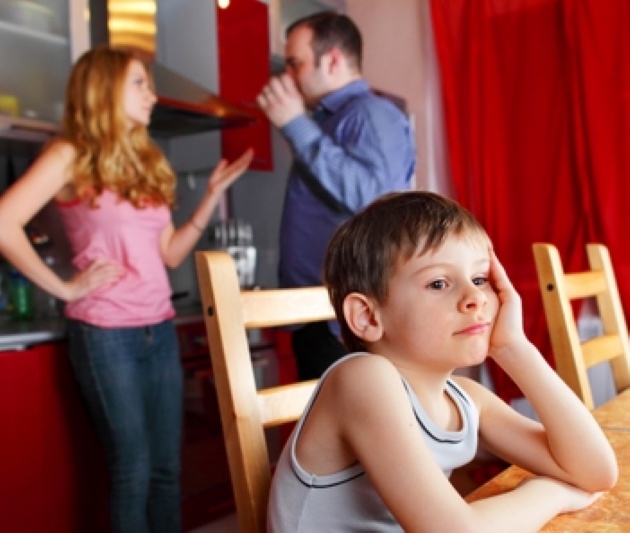Parents often want me to see their children
because they are concerned about the impact couple issues, including sometimes
their separation or divorce, may have on the child. They question whether they should stay
together for the sake of the children.
They fear that divorce many damage the children. They want me to see the child in order to
make sure that the child will be “OK” or else to deal with anxiety or behaviour
problems that they feel are linked to the rise in their couple conflicts. There
are definitely many things that a psychologist can do to help parents and
children cope with separation and divorce, to minimize the negative effects on
the child, to address the child’s fears, worries, and behaviours, and to
facilitate their adjustment to a new living arrangements. I love to help and I will…but parents have to
be aware of some very important things and commit to conscious parenting as
they simultaneously navigate their couple, and/or custody, issues. After all, I will probably only see their
child once a week for a few weeks or perhaps months, but their child will be
forever theirs. So my work begins with
the parents and psycho-education, or teaching.
Here are some of the most important things I share with parents;
1. Couple conflict, rather than divorce itself, is the “damaging”
element. All parents disagree at times,
but those who escalate to fighting, to aggression, to disrespect, and to
offensive behaviour and do so in front of the children are harming them. They are creating fear and anxiety in their
children. Following a separation or
divorce, most children may display some changes in behaviour, and may express
some sadness and anger in the short term.
However, most “bounce back”. Parental conflict, on the other hand, whether
a couple is divorced or not, has been shown to have detrimental effects on
children. Studies have also shown that
children welcome the relief that divorce brings from parental conflict, and
that children may actually experience improvements in their well-being.
2. If I or any therapist has
any chance to successfully buffer the effects of a separation or divorce, then
parents have to collaborate.
Collaborating may mean getting help for themselves. It is often difficult to be a good parent
even in the best of times, and it may be especially difficult when a parent is
themselves in tremendous pain and distress.
This is why parents should seriously consider getting help for
themselves. Many deny needing help, and
tell me, “Oh I’m OK, I’ll survive this, I can handle this…it’s my child that
needs help”. Your child needs YOUR
help. So help yourself first, in order
to be able to help your child.
3. Children who are exposed to high parental conflict may become
depressed, anxious, distracted and have difficulty learning, or keeping up
their grades. They may also “act
out”. This is because parental conflict
attacks their security. Children need
their parents to behave like mature adults that they can rely on. Children need to feel that their parents are
in control and capable of taking care of them.
Then they can trust that their security needs can be met by the parents,
and they can relax, and feel secure, play appropriately, learn, etc... Intense marital conflict conveys that parents
are distressed, out of control, pre-occupied with their own issues, and may not
be able to provide the basic safety net every child needs.
4. If parents don’t handle
their marital conflicts appropriately, or they don’t engage in appropriate
divorce behavior around the children (despite the many guidelines available in
print and on the internet), then
children will also be left carrying the burden of care for the situation
(if only in their little hearts and
souls). That is, children will expend
much thought and emotional resources to figuring out how to make mom and dad
happy, how to solve their money problems so they won’t fight, and how to bring
them back together. I have seen many
children walk on eggshells around parents, ever so careful to be the model
child. This creates anxiety. Or on the contrary, children may act out, get
into fights, break rules, etc… This type of drastic behaviour may be necessary
in order to get the parents to parent
them. It also workds to distract
them from their own couple problems. Being
called to the principal’s office may result in a few minutes of parental collaboration
(even if only for the sake of appearances in front of the principal). It is amazing how reinforcing this may be for
a child…and a pattern develops ever so quickly after this…just for those few
minutes when parents revert to being parents rather than foes. Even the kids who act out usually feel
intense anxiety, insecurity, and sadness as a result of the family instability
expressed in couple conflicts. Bringing
the parents together in the principal’s (or therapist’s) office can be quite
re-assuring.
5. Most children are attached securely to both their mother and their
father, and their parents are a reflection of their identity. When they look in the mirror, they are
part-mom and part-dad. Thus, when one
parent disrespects the other, that child’s identity will be injured. For example, if a mother calls the father a
terrible name, that child will question…if
Dad is a “insert disrespectful term” , and I am part-dad, then what does
this say about me? And so begins the
erosion of our self-worth, our self-esteem and our lovability and in worst case
scenarios, a sense of shame seeps in.
While children may obsess about Spiderman and Cinderella, their favorite
heros, the ones they can always count on to save them, are mom and dad. Don’t shatter this illusion before necessary
with out of control, angry and frightening behaviour…they will eventually
figure out that parents are only human but they should come to this realization
gently and after the superhero identify is no longer necessary for their emotional
security.
I hope these basic guidelines will be helpful for those parents
coping with couple issues and who are worried about the impact of these issues
on their children. Consulting for
yourself or for your child can open the door to many more individualized
interventions that will help your particular situation and your child.

 In The Latest Issue:Latest Issue:
In The Latest Issue:Latest Issue:
- Celebrating Community an...
- Celebrating the Unsung H...
- Understanding Newborn St...
Articles
Calendar
Virtual- ANNUAL TEACHER APPRECIATION CONTEST
- APPUI LAVAL
- ARTS & CULTURE
- CAMPS
- CAR GUIDE
- CCIL
- CENTENNIAL ACADEMY
- CHARITY FUNDRAISING
- CITYTV
- COSMODÔME
- COMMUNITY CONNECTIONS
- COVER STORY
- DINA DIMITRATOS
- ÉCOLE SUPÉRIEURE DE BALLET DU QUÉBEC
- EDITORIALS
- ÉDUCALOI
- EDUCATION
- EMPLOYMENT & ENTREPRENEURSHIP
- FÊTE DE LA FAMILLE
- FÊTE DU QUARTIER SAINT-BRUNO
- FAMILIES
- FESTIVAL LAVAL LAUGHS
- FÊTE DE QUARTIER VAL-DES-BRISES
- FINANCES
- GLI CUMBARE
- GROUPE RENO-EXPERT
- HEALTH & WELL-BEING
- 30 MINUTE HIT
- ANXIETY
- CHILDREN`S HEALTH & WELLNESS
- CLOSE AID
- DENTAL WELLNESS
- EXTREME EVOLUTION SPORTS CENTRE
- FONDATION CITÉ DE LA SANTÉ
- GENERAL
- HEARING HEALTH
- MESSAGES FROM THE HEALTH AGENCY OF CANADA
- MENTAL HEALTH
- SEXUALITY
- SOCIAL INTEGRATION
- SPECIAL NEEDS
- TEENS
- THE NUTRITION CORNER
- THE NUTRITION CORNER - RECIPES
- VACATION DESTINATION
- WOMEN'S FITNESS
- WOMEN'S HEALTH
- HILTON MONTREAL/LAVAL
- HOME & GARDEN
- INTERNATIONAL WOMEN'S DAY
- JAGUAR LAVAL
- LAVAL À VÉLO
- LAVAL FAMILIES TV SHOW
- LAVAL FAMILIES MAGAZINE CARES
- LAVAL URBAN IN NATURE
- LE PARCOURS DES HÉROS
- LES PETITS GOURMETS DANS MA COUR
- LEON'S FURNITURE
- LEONARDO DA VINCI CENTRE
- LFM PREMIERES
- LIFE BALANCE
- M.P. PROFILE
- MISS EDGAR'S AND MISS CRAMP'S SCHOOL
- MISSING CHILDREN'S NETWORK
- NETFOLIE
- NORTH STAR ACADEMY LAVAL
- OUTFRONT MEDIA
- PASSION SOCCER
- PARC DE LA RIVIÈRE-DES-MILLE-ÎLES
- PÂTISSERIE ST-MARTIN
- PIZZERIA LÌOLÀ
- PLACE BELL
- PORTRAITS OF YOUR MNA'S
- ROCKET DE LAVAL
- SACRED HEART SCHOOL
- SCOTIA BANK
- SHERATON LAVAL HOTEL
- SOCIÉTÉ ALZHEIMER LAVAL
- STATION 55
- STL
- SUBARU DE LAVAL
- TECHNOLOGY
- TEDXLAVAL
- TODAY`S LAURENTIANS AND LANAUDIÈRE
- TODAY`S LAVAL
- WARNER MUSIC
- THIS ISSUE
- MOST RECENT
Magazine
Parental conflict and the impact on children’s anxiety and behaviour problems
Articles ~e 105,7 Rythme FM 4 chemins Annual Teacher Appreciation Contest Appui Laval Arts & Culture Ballet Eddy Toussaint Camps THIS ISSUE MORE...
CONTESTS Enter our contests
CONTESTS Enter our contests
CALENDAR
Events & Activities
COMMUNITY Posts Events
PUBLICATIONS Our Magazine Family Resource Directory
LFM BUSINESS NETWORK Learn more
COUPONS Click to save!
COMMUNITY Posts Events
PUBLICATIONS Our Magazine Family Resource Directory
LFM BUSINESS NETWORK Learn more
COUPONS Click to save!
SUBSCRIPTIONS
Subscribe to the magazine
Un-Subscribe
E-NEWSLETTER Subscribe to our E-newsletter Un-Subscribe
WRITE FOR US Guidelines & Submissions
POLLS Vote today!
E-NEWSLETTER Subscribe to our E-newsletter Un-Subscribe
WRITE FOR US Guidelines & Submissions
POLLS Vote today!
ADVERTISERS
How to & Media guide
Pay your LFM invoice
SUGGESTIONS Reader's Survey Suggest a Listing
LFM About Us Our Mission Giving Back Contact Us
SUGGESTIONS Reader's Survey Suggest a Listing
LFM About Us Our Mission Giving Back Contact Us
 PICK-UP LOCATIONS
Get a copy of LFM!
PICK-UP LOCATIONS
Get a copy of LFM!
TERMS & CONDITIONS Privacy | Terms
ISSN (ONLINE) 2291-1677
ISSN (PRINT) 2291-1677
Website by ZENxDESIGN



 BY:
BY: 


Tweet
Share